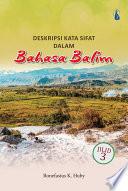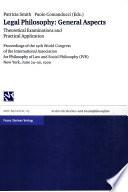
Deskripsi Kata Sifat dalam Bahasa Balim
Mengenal Bahasa Balim 3
Masalah bahasa dan sastra di Indonesia berkenaan dengan tiga masalah pokok yaitu masalah bahasa nasional pada umumnya, bahasa daerah, dan bahasa asing. Dari ketiga masalah pokok tersebut perlu digarap dengan sungguh-sungguh dan terencana dalam rangka pembinaan dan pengembangan bahasa Indonesia. Pembinaan bahasa ditujukan pada peningkatan kualitas pemakaian bahasa yang baik dan benar. Pengembangan bahasa ditujukan pada pemenuhan fungsi bahasa Indonesia sebagai sarana komunikasi nasional dan sebagai wahana pengungkapan nilai rasa bahasa dalam kehidupan sosial dan bermasyarakat sesuai dengan perkembangan zaman. Dalam rangka upaya pencapaian tujuannya itu, maka perlu dilakukan penelitian atau penulisan untuk mendeskripsikan aspek-aspek bahasa daerah, bahasa Indonesia, maupun bahasa asing. Bahasa daerah Balim merupakan salah satu bahasa daerah yang ada di Indonesia pada umumnya dan bahasa daerah di Papua pada khususnya. Oleh karena itu, bahasa daerah Balim ini perlu diangkat ke permukaan sehingga mampu bersaing dengan bahasa daerah lain yang ada di Indonesia. Kehadiran buku Deskripsi Kata Sifat Bahasa Balim merupakan salah satu upaya penulis dalam rangka melestarikan bahasa daerah Balim agar tidak mengalami kepunahan dan diharapkan tetap dapat dipertahankan dan dikembangkan oleh para penutur-penuturnya.
- ISBN 13 : 9792171363
- ISBN 10 : 9789792171365
- Judul : Deskripsi Kata Sifat dalam Bahasa Balim
- Sub Judul : Mengenal Bahasa Balim 3
- Pengarang : Bonefasius K. Huby,
- Kategori : Foreign Language Study
- Penerbit : PT Kanisius
- Bahasa : id
- Halaman : 68
- Google Book : https://play.google.com/store/books/details?id=yZJLEAAAQBAJ&source=gbs_api
-
Ketersediaan :
D. Kata Sifat Perulangan Kata Majemuk dalam Bahasa Balim Kata sifat yang ditulis dalam kalimat-kalimat di bawah ini merupakan kata-kata perulangan (= reduplikasi) kata majemuk dalam bahasa Balim. Kata-kata majemuk reduplikasi merupakan ...








